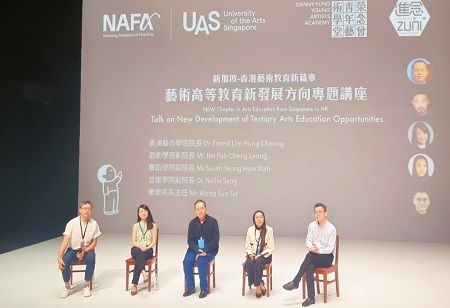- Hong Kong and Singapore launched Asia’s first three-year BA program in Contemporary Chinese Theaters at NAFA and UAS.
- The program blends traditional Chinese opera techniques with contemporary expression, cultural understanding, and cross-Asian artistic exchange.
- Educators emphasize holistic arts education, combining technical skill, personal growth, industry readiness, and engagement with societal and global issues.
The aims of the first three-year bachelor's degree program in Asia's new Chinese theatres were discussed at the Hong Kong Cultural Centre during talks on establishing higher arts education in Singapore and Hong Kong. Hosted by Hong Kong arts organization Zuni Icosahedron and the University of the Arts Singapore, experts discussed the intricacies involved in developing the inner life of artists, emphasizing the plight of art educators.
Rei Poh Cheng-leong, who is associate dean of the School of Theatre at Nanyang Academy of Fine Arts, launched the institution's Bachelor of Arts (Honors) Contemporary Chinese Theaters program Asia's first three-year BA course to graduate thespians who are cognizant of the appreciation of history, cultures and language of contemporary Chinese theaters.
"In the first year, they will learn the techniques and expression of traditional Chinese operas and test the embodiment of Chinese culture through theatre practices", he said. Cultivating the capacity to inherit traditional and make contemporary presentations and self-expressions is among the important points of assessment of the course, he added.
Mathias Woo, artistic director at Zuni, said his company has made input into designing the degree course. The students can exchange dialogue with artists from other Asian cultures and nations, learn about different genres of theater art embodiment, and develop reactions to the industry's needs at present in Chinese theatre, he said. "Many of the students in this program are from the Chinese mainland. In Singapore, they are able to enter higher arts education programs conducted in their native language, Chinese", he added.
UAS Vice-Chancellor Kwok Kian-woon opined that theater and drama could be especially useful to teach major contradictions of a rapidly changing world, like the one between technological progress and its effect on mankind.
Also Read: WCM-Q Mentorship Program Supports Students in Medical Journey
"The production of art is based on particular traditions handed down through generations. The transmission of artistic traditions is through mentorship and yet is subject to questioning, innovation and creative leaps, particularly when technology changes", Kwok stated.
The educators concurred that, in addition to specialized competencies, arts education needs to equip young people with the capability for personal development and the ability to engage with ever-more complex societal and global issues. Wong Sun-tat, NAFA's head of Chinese Instrumental Studies, added that the performance industry constantly changes, and students need to be trained amidst reality. The school provides opportunities for internships from the initial stages of the course to equip them with the right techniques and mindset.
Nellie Seng, NAFA's associate dean of the School of Music, explained that musical excellence is not only about technical proficiency but also the all-around development of the musician, both as an artist and individual. Susan Yeung How-wah, NAFA School of Dance associate dean, emphasized that the path to becoming a dancer, wrought with perseverance and discipline, is worth every bit for one's development. The training requires an open mind, willingness to accept discomfort, constant challenging of oneself, and most importantly, persistence.
Anna CY Chan, director of Hong Kong's Academy for Performing Arts, called on educators and policymakers to accept the challenge of expanding educational practices and engaging in discussions that confront the creative tensions and issues through collaboration and partnerships. The University of the Arts Singapore is the city-state's first arts university, established on a partnership of outstanding arts institutions LASALLE College of the Arts and the Nanyang Academy of Fine Arts.

